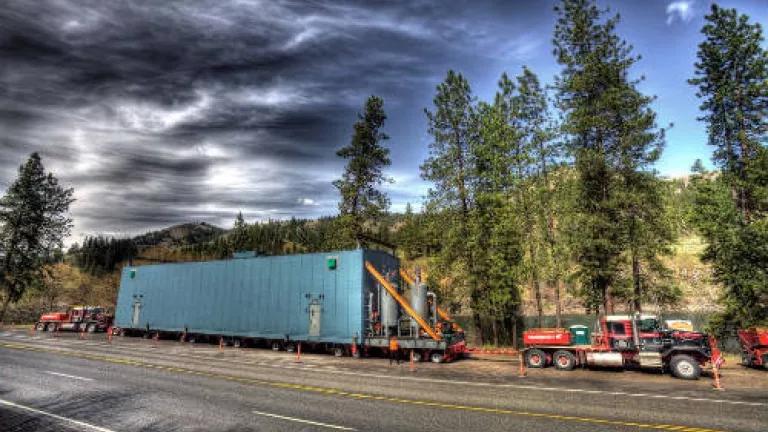
On Monday, April 18, a Montana state judge issued a temporary restraining order that indefinitely suspends efforts by Exxon and the State of Montana from improving turnouts and other additional infrastructural modifications to the state’s highway system that would be needed to facilitate over 200 planned “megaload” shipments. As discussed in a previous post, Exxon is proposing to ship over 200 oversized shipments of mining equipment to Exxon’s Kearl tar sands operations in Alberta by establishing a ‘shortcut’ route through the Lolo Pass high in the Rocky Mountains that connects Idaho and Montana.
"In a module down by the river." The test shipment parked by the Clearwater River. With a temporary restraining order in place, we can hope that the Clearwater will not have to be subjected to additional shipments for at least the near future. Photo credit: Dave King
Last week, Exxon, along with its Canadian subsidiary Imperial Oil, received permission from Idaho and Montana to transport one oversized module for what was being called a “test” shipment. That test shipment, which is over 200-feet long, did not go according to plan on April 11. Instead of traversing the 182-mile Lolo Pass, the shipment first hit a tree and then later a utility pole. The latter accident caused a five-hour blackout out, knocking out power to a pair of Idaho towns. Due to these troubling errors, the shipment was suspended and has since been parked on the side of Highway-12 adjacent to the Clearwater River in Idaho.
Today’s order does not suspend the test shipment, which is tentatively planning to resume its woebegone journey on Monday night, April 18. However, the order does prevent construction on turnouts and the widening of the highways in Montana, which are needed to allow for the additional 200 proposed shipments. It also precludes further work on such measures as the burial of utility lines – a proposed action that has concerned regional tribes given the potential impacts to cultural resources in this historically notable region. Given that neither the state of Idaho nor Montana bothered to look at the gross environmental impacts of Exxon’s proposal, the timing of this restraining order could not come at a better time.
Kudos to the attorneys and plaintiffs that are challenging these shipments, whose coalition is the sum of a regional effort comprised of a broad set of interests and concerned organizations (and one should also mention in joining this milieu, last week’s news that the Nez Perce of Idaho and Montana's Confederated Salish and Kootenai Tribes have intervened in this legal action). And this is not the only lawsuit, for there is an emerging federal challenge lead by Advocates for the West and Idaho Rivers United. Their particular action notes that the federal government has abdicated its responsibility in analyzing the cumulative impacts that would result in establishing a new industrial shipping route in the heart of one of the nation’s first Wild and Scenic River corridors. This is only the beginning, but it looks hopeful that a full airing of what Exxon has truly proposed can finally occur.

